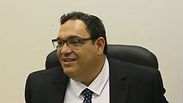
New school rules: Say goodbye to dreaded psychometric tests
Education Minister Shai Piron announces new plan to change requirements for applicants to higher education
University hopefuls who take the PET, often after a break of several years from formal education due to national service, study intensively for the test, often at great expense. Representatives of Israel's poorer and minority sectors claim that the PET puts their students at a disadvantage.
In a few weeks the Education Ministry will determine the minimum grade requirement on the bagrut – most likely focusing on three primary subjects – which will allow students an exemption from the PET, which tests students on English, mathematics and verbal reasoning.
Under the terms of the agreement reached with the board of university directors, representatives of the board will take part in the future writing of questions for the bagrut. The universities will expand the disciplines for which students can be accepted into based on their bagrut and without the PET.
Related stories:
- Lapid, Piron introduce summer school program
- Ministry considering cutting summer vacation by month
- Increase registered in overall matriculation rates
It is likely the Education Ministry and the board of university directors will decide on an average grade of 87 in advanced courses in mathematics, English, and Hebrew.
The Education Ministry indicated that the new bagrut test will have a new component, whereby 30 percent of the grade will be based on internal testing determined by schools, whether a research project or another assignment.
The beginning of the bagrut testing will be pushed back one year, from the end of tenth grade to the end of eleventh grade. Instead, tenth-grade scores will make up 10 percent of the final grade on the bagrut.
Professor Manuel Trajtenberg, chairman of the Planning and Budgeting Committee of the Council for Higher Education in Israel, welcomed the reforms, saying "it will minimize the academic gaps for high school graduate from the geographic and social periphery, and will provide more equal opportunities for entry into academia for every layer in Israeli society."
The chairman of the national parents association, Gideon Fisher, also expressed support for the reform proposal: "The PET perpetuates the economic gaps in this country. Kids whose parents have money study in organized courses or pay for private lessons to prepare for the tests, but the kids whose parents don't – get left behind. This reform could lead to change in the social and financial disparity."
Israel's National Students and Youth Council said that,"the variety of bagrut tests and their spread over three academic years created a massive burden and brought the school system towards a situation where schools are focused on teaching for the test and on chasing higher scores.
"We hope the new reforms presented by the minister will allow us, the students, meaningful studies, based in authentic curiosity and not in the pursuit of an 'easy life.'"
The minister's announcement brought up memories of the previous 2003 attempt to reform the university acceptance procedures – which failed the same year. What changed since then? "The time is ripe," claim academic sources.
The Education Ministry also attempted to loosen up the entry requirements in May 2002 in the hope of increasing the chances for ethnic minorities to be accepted. Those students received exemptions from the PET based on an agreed-upon minimum grade in the mathematics, English, and history bagrut.
The decision reflected the conclusions of studies which had shown that bagrut grades predict future academic success as accurately as the PET. However, the reform was quickly overturned.
Shahar Chai contributed to this report










